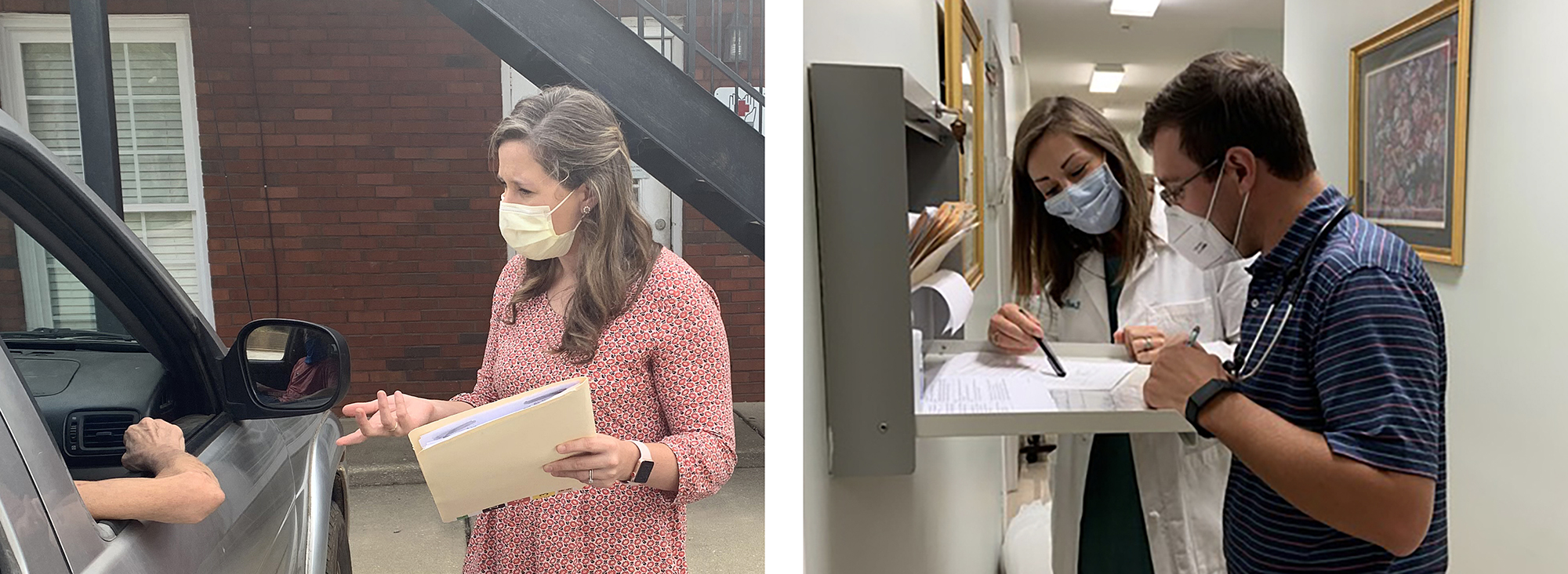 Dr. Jeanna Sewell (left) and Dr. Katelin Lisenby (right) work in their community clinics.
Dr. Jeanna Sewell (left) and Dr. Katelin Lisenby (right) work in their community clinics.
October 22, 2020
AUBURN, Alabama - Committed to taking care of the less fortunate in our communities, two Harrison School of Pharmacy faculty members are actively involved with clinics dedicated to helping the underserved.
Dr. Jeanna Sewell and Dr. Katelin Lisenby, both both faculty members in the Department of Pharmacy Practice count these clinics as one of their active practice sites. Sewell has worked with Mercy Medical in Auburn since 2016 while Lisenby has worked with Good Samaritan Clinic since 2015.
Mercy Medical was started by local physician Dr. Dell Crosby in 2000. The faith-based clinic only saw patients without insurance until a year ago and has now expanded to include those with Medicaid. Supported by community donations, a limited staff and a large group of volunteers, the clinic saw nearly 3,000 patients last year. Most patients are seen on a regular basis to manage chronic health conditions.
Similarly, Good Samaritan Clinic, or GSC, is an interdenominational Christian ministry and free health clinic that provides primary health and dental care and referral for low-income persons who are medically uninsured or underinsured residents of West Alabama. Opened in 1999, it is a 501(c) nonprofit that is supported by contributions and volunteer staffing. Health care professionals at the clinic include physicians, nurse practitioners, pharmacists, nurses, dentists, nutritionists and dieticians, counselors and social workers.
Sewell works in multiple roles at her clinic, including chronic disease state management, such as hypertension or diabetes, and transitions of care where she follows up with recently discharged patients based on referral from social workers and nurses at East Alabama Medical Center.
“Mercy Medical serves as a source for primary and acute care for uninsured and Medicaid patients in our area,” said Sewell. “There are very limited resources for this patient group in our area as few providers are able to see uninsured patients at a cost that is affordable to these patients. By allowing patients access to medical care, the goal is that they won’t wait until their health conditions are very out of control, leading to poor health outcomes and increased burden on the patient and health care system.”
At GSC, pharmacists had been involved since its inception, but it was not until Lisenby’s arrival that pharmacy services were further developed. She works in a shared visit model with the physicians to evaluate each patient’s pharmacotherapy, provide recommendations and serve as a referral resource for other staff on medication-related issues.
“A lack of primary care and health insurance is associated with poor health outcomes and health disparities,” said Lisenby. “The GSC exists to serve this need focusing on primary care, but also provides services and referrals, as well as education, wellness, and spiritual and social support.”
Harrison School of Pharmacy students, in both their second and fourth years, have the opportunity to work and learn at each of the clinics. Students have the opportunity to interact with a variety of health care providers and a diverse patient population.
“While on this rotation, students get to experience the added complexities of caring for patients who are underserved,” said Sewell. “Transportation limitation, food insecurity and lack of financial resources are frequent situation that our patients face and students are exposed to what their role can be in assisting these patients.”
For Lisenby and Sewell, both Auburn University graduates, their work at their respective clinics was a natural decision in living up to the Auburn Creed and the university’s land-grant mission.
“Auburn University is dedicated to improving the lives of the people of Alabama through selfless service, which embodies all that we do at the GSC,” said Lisenby. “Outreach should align with this mission and meet our communities’ most pressing needs”
----------
Auburn University’s Harrison School of Pharmacy is ranked among the top 25 percent of all pharmacy schools in the United States, according to U.S. News & World Report. Fully accredited by the Accreditation Council for Pharmacy Education (ACPE), the School offers doctoral degrees in pharmacy (Pharm.D.) and pharmaceutical sciences (Ph.D.) while also offering a master’s in pharmaceutical sciences. The School's commitment to world-class scholarship and interdisciplinary research speaks to Auburn's overarching Carnegie R1 designation that places Auburn among the top 100 doctoral research universities in the nation. For more information about the School, please call 334.844.8348 or visit http://pharmacy.auburn.edu.